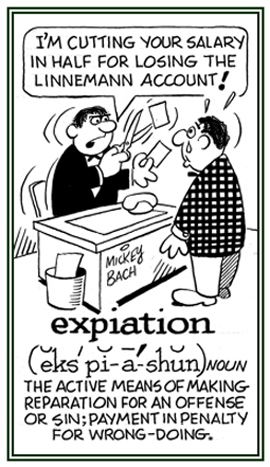-tion
(Latin: a suffix forming nouns from verbs of condition and action; an act or process: resumption, absorption; state or condition, redemption, exhaustion; something resulting from or otherwise related to an act or process, assumption, friction)
This unit is presenting a small fraction of the hundreds of words ending with the suffix of -tion; however, there is a significant number of words which may help everyone have a better understanding and appreciation of the use of this element.
2. People who participate in organized trips with defined goals: The expedition had to sleep in tents while they were in the desert during their explorations.
3. Etymology: from the Latin verb expedire, which originally had the meaning: "free one’s feet" from a snare, for example.
An expedition is often a group of people sent on some important undertaking and so their feet must be free to move without hindrance.
2. The act of making amends or reparations for a wrongdoing: Because Tony drove his father’s car through muddy roads, an expiation was expected of him in the form of thoroughly washing the vehicle until it was clean again.

Go to this Word A Day Revisited Index
so you can see more of Mickey Bach's cartoons.
2. A clarification of a subject, or topic, that may be difficult to understand: Celia consulted an encyclopedia about astronomy for a better exposition about the stars and planets.
Judge Smithson prepared a detailed exposition to explain the difficult decision she rendered.
3. A public exhibition, display, or show, consisting of artistic goods or words of art, etc. or industrial developments: The annual agricultural exposition will be held on the fair grounds near the large parking lot.4. That part of a literary or dramatic work in which the basic facts of the setting and character are made known: The playwright provided a clear exposition of the stage scenery and costumes for the actors.
Fortunately, the police had been informed by the elderly lady and they were waiting to arrest the woman and, later, the so-called nephew for their criminal extortion.
2. The illegal use of someone's official position, or powers, to obtain property, funds, or patronage: A secretary of a businessman threatened extortion by saying she would turn him in for embezzling money from his company unless he paid her a sum of cash.3. Etymology: from Latin extorquere, "to wrench out, to wrest away"; from ex-, "out" + torquere "to twist".


Go to this Word A Day Revisited Index
so you can see more of Mickey Bach's cartoons.
2. The act of copying or removing a passage from a text: Mildred was able to get certain extractions clarifying the life of the author from his memoirs.
3. The removal of a tooth or teeth: Sally had to go to the dentist to have a dental extraction performed because of a severe case of molar decay.
Extractions of one or more teeth may be performed when a tooth is severely decayed, when an abscess has formed, or when a tooth is too badly broken to be repaired by crowning or root-canal treatment.
4. In chemistry, the separation of a substance from a mixture by dissolving one or more of the components in a solvent: There are different types of extractions, one of which is decoction, which is the removal of water-soluable drug substances by boiling them in water.5. The ethnic origin or the original nationality of someone's ancestors: Jane's husband was of Spanish extraction.
2. A number of persons who are formed to seek some objective within a political party or a government: A faction suggests some quarrelsome dissent from the objectives pursued by those who are part of a majority of officials.
3. A literary work or film that is a mixture of fact and fiction: Some novels present history as a faction so the reader is always fascinated by the events that took place at some other time.
4. Etymology: from Latin factionem, "political party, class of people"; literally, "a making or doing", from facere, "to do".

Go to this Word A Day Revisited Index
so you can see more of Mickey Bach's cartoons.
2. A novel, story, or other work of fiction.
3. Something that is untrue and has been made up to deceive people: "The account of that incident was pure fiction."
4. The act of pretending or inventing something: "They were living the fiction that their marriage had become.
5. Something that is assumed in law to be true regardless of whether or not it is true.
6. Etymology: from about 1398, "something invented", from Latin fictionem (nominative case, fictio), "a fashioning" or "feigning"; from fingere, "to shape, to form, to devise, to feign", originally "to knead, to form out of clay".
2. A small disconnected piece; a fragment.
3. A small part or item forming a piece of a whole.
4. Etymology: from Late Latin fractionem, fractio, "a breaking"; especially, into pieces, from the Latin root of frangere "to break".


